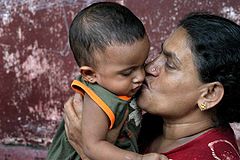olin
 | |
| Pronunciation | /ˈo |
|---|---|
| Usage | 2023: Core (100% ↗︎ )2022: Core (99%) |
| Book and era | nimi pu |
| Part of speech | Content word |
| Codepoint | U+F1945 |
olin is a core content word relating to love and emotional bonds.
Etymology[edit | edit source]
The word olin is derived from Croatian volim, meaning "I love".[1]
Semantic space[edit | edit source]
The semantic space of olin includes strong emotional bonds and affection, such as many kinds of love, be it platonic, familial, or romantic.[2] It may refer to the object of affection, as in a love interest.
mi olin e jan mimi olin e jan mi.
I love my partner.
olin mi li suwiolin mi li suwi.
My partner is sweet.
The semantic space of olin does not map completely to the English concept of the words love and like. Notably, according to many speakers, olin does not include a inclination or preference towards something; this is expressed with a longer phrase, such as [ni] li pona tawa mi ("[this] is good towards me") or mi la [ni] li pona ("for me, [this] is good").[3]
Others are less restrictive. Notably, in the book Toki Pona: The Language of Good, the word olin is used to mean being a fan:
kulupu lili li kama ona li olin e toki-ponakulupu lili li kama. ona li olin e toki pona.[4]
A small community of Toki Pona fans emerged.
pu[edit | edit source]
In the "Official Toki Pona Dictionary" section, the book Toki Pona: The Language of Good defines olin as:
VERB to love, have compassion for, respect, show affection to
ku[edit | edit source]
For Toki Pona Dictionary, respondents in ma pona pi toki pona translated these English words as olin:[5]
loving5, love5, romance4, romantic3, compassion3, attraction2, intimate2, passion2, beloved2, loyalty2, loyal1, faithful1, dear1, mercy1, darling1, passionate1, care1, appreciation1, crush1, respect1
sitelen pona[edit | edit source]
The sitelen pona glyph for olin () is derived from two heart radicals stacked on top of each other; these may be drawn either connected (olin1) or separated. Compare the glyph for pilin, which consists of a single heart.
An alternative variant of olin (olin2)[created by whom?] consists of a heart radical with emitters above. It dates to 2020 or earlier.[6][primary source needed]
sitelen sitelen[edit | edit source]
The sitelen sitelen word glyph for olin (olin) is composed of a heart shape with two circles inside. The circles may be simplified to dots when the glyph is written small. The exact influences for the design of this glyph are unknown.
References[edit | edit source]
- ↑ "Word Origins". tokipona.org. Archived from the original on 8 August 2002.
- ↑ lipamanka. "toki pona dictionary". lipamanka.gay.
- ↑ "Lesson 10: Questions Using seme". lipu pi jan Pije. Archived from the original on 17 April 2020. Retrieved 14 June 2024.
- ↑ Lang, Sonja. (25 May 2014). Toki Pona: The Language of Good. Tawhid. ISBN 978-0978292300. OCLC 921253340. p. 9.
- ↑ Lang, Sonja. (18 July 2021). Toki Pona Dictionary. Illustrated by Vacon Sartirani. Tawhid. ISBN 978-0978292362. p. 305.
- ↑ lipamanka [@lipamanka]. (21 June 2024). [Message posted in the
#unicodechannel in the ma pi nasin sitelen Discord server]. Discord. Retrieved 25 June 2024. "olin (emitters) - waso Asuto was using this already when I joined the community, I have no idea but it's at least as old as 2020".
Further reading[edit | edit source]
- "olin" on lipu Linku
- "olin" on lipu Wikipesija
- "olin" on English Wiktionary
